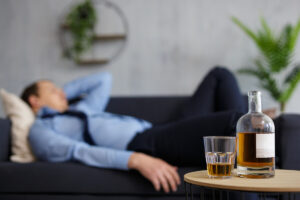
One week you feel on top of the world, socializing with everyone you meet and bouncing from one activity to the next. You overindulge in alcohol use, since it makes you feel good and keeps you in a good mood. The next week, though, you feel as if you’ve hit rock bottom. You feel sad, irritable and lonely, so you drink to try to cope.
Break free from alcohol addiction at our beautiful Denver rehab: call us at (720) 891-4657.
These episodes of mania and depression are common with bipolar disorder. But are they triggered by your alcohol use or is your bipolar disorder making you drink more than you should?
The Comorbidity of Alcohol Use and Bipolar Disorder
Substance use and alcohol addiction can unfortunately occur together with co-occurring mental illnesses. In fact, it is estimated by the National Institute on Drug Abuse that nearly 8 million Americans who struggle with a substance use disorder also have a co-occurring mental illness such as bipolar disorder.
The co-occurrence of bipolar disorder and alcohol abuse is more common than originally thought. In an epidemiological study of psychiatric disorders by the National Institute of Mental Health’s Epidemiologic Catchment Area (ECA), researchers sought to determine just how common this comorbidity is.
Ultimately, the researchers found that more than 60 percent of people with bipolar I disorder and nearly 50 percent of people with bipolar II disorder also struggle with addiction.
At this point, research only has theories as to why alcohol abuse and bipolar disorder are often diagnosed together. For example, behavioral health experts believe genetics and family history play a role in a person’s likelihood of suffering from both disorders. It may also be possible that one disorder triggers or worsens the other.
What is Bipolar Disorder?
Bipolar disorder is a mental disorder characterized by bouts of extremely elevated mood, euphoria, sleeplessness, and even psychosis or mania. These periods of mania combine with periods of serious depression.
The multiple types of bipolar disorder can be affected by alcohol use in which those suffering from the mental disorder try to balance their ever-changing moods with alcohol.
Does Alcohol Use Trigger Bipolar Disorder?
There is currently no evidence that alcohol use actually causes bipolar disorder.
However, a 1998 study found that alcohol can have the same effects on the brain that bipolar disorder does, prompting manic and depressive symptoms.
Behavioral health experts have also found that alcohol addiction and bipolar disorder can aggravate symptoms caused by the other, enforcing a vicious cycle of bipolar symptoms and alcohol abuse.
This is especially the case during alcohol withdrawal since alcohol withdrawal and bipolar disorder affect the same brain chemicals, or neurotransmitters.
If you’ve been diagnosed with bipolar disorder, you’re already familiar with manic symptoms like euphoria, rapid thoughts and speech, irritability, and impulsivity. Alcohol consumption can trigger similar symptoms by flooding your brain with dopamine and lowering your inhibitions. Additionally, it’s important to note that alcohol abuse can lead to various health complications as you age, including the 5 Health Complications from Alcohol Abuse as You Age.
So, if you’re in the middle of a manic episode, alcohol abuse will make your symptoms of mania much more severe.
The same is true of your depressive episodes caused by bipolar disorder. These episodes may include feelings of worthlessness and extreme sadness. You may even struggle with thoughts of suicide. Alcohol is a depressant, so instead of making you feel better, it’ll ultimately worsen your depression symptoms and may even elevate your suicidal thoughts to life-threatening behaviors.
While it’s unclear if alcohol abuse actually causes bipolar disorder, alcohol and bipolar disorder can worsen one another’s symptoms until your quality of life is diminished. The best way to get this co-occurring condition under control is by seeking dual diagnosis treatment from a credible addiction treatment center.
Get Dual Diagnosis Treatment at The Raleigh House
There is a way to break the cycle of alcohol abuse and bipolar disorder, and it starts with treatment at The Raleigh House. For over 10 years, we’ve helped people just like you recover from dual diagnosis disorders through personalized care that includes behavioral addiction treatment.
With a gold standard continuum of care, we can help you detox from alcohol abuse, work through your bipolar disorder and develop healthier ways to manage your manic and depressive episodes.
Are you ready to rewrite your story and stop alcohol abuse and mood disorder from controlling your life?
Contact our admissions team today to find out how to get started.
